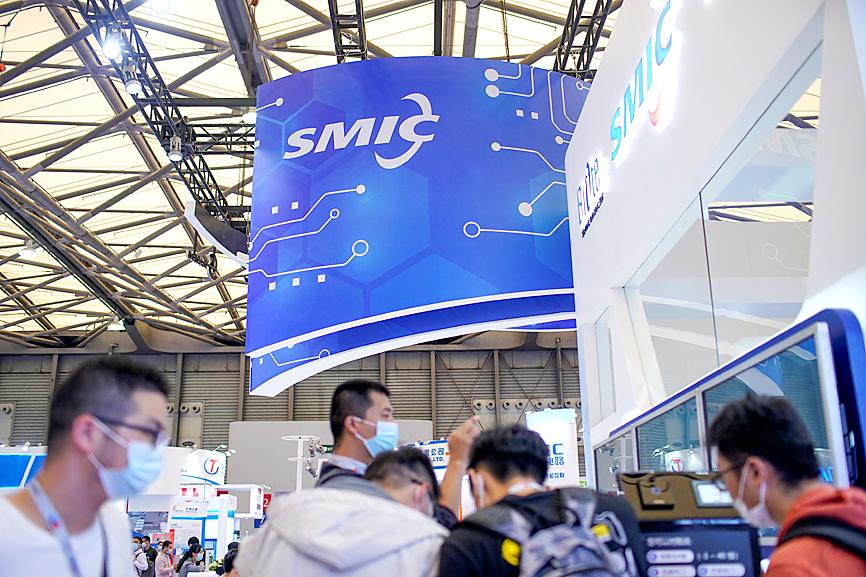China’s biggest chipmaker has cut its outlook for the second quarter, joining a growing list of manufacturers warning about the fallout from lockdowns aimed at containing the country’s worst COVID-19 outbreak in two years.
Semiconductor Manufacturing International Co (SMIC, 中芯) estimates a month-long lockdown in Shanghai could spur component shortages and logistics tangles, and erase about 5 percent of its output in the second quarter.
“We are trying our best to mitigate the impact on product delivery,” SMIC Chairman Gao Yonggang (高永崗) told analysts on a call yesterday morning. “We are still assessing the actual impact as many suppliers restart their operation.”

Photo: Reuters
China’s “zero COVID-19” strategy, which relies on a playbook of closed borders, quarantines, lockdowns and mass testing, is upending its giant manufacturing sector even as the rest of the world lives with the virus and opens up. The impact has been particularly keen in the eastern region around Shanghai, which is struggling to contain an outbreak.
Hua Hong Semiconductor Ltd (華虹半導體), another Shanghai-based chipmaker, on Thursday also warned of potential impact from lockdowns and logistic disruptions on Thursday.
Some have bucked the trend.
SMIC jumped as much as 3.1 percent in Hong Kong yesterday after reporting profit more than doubled in the first three months, thanks to consistently strong demand for the chips used in everything from connected devices to electric vehicles.
However, the pain for manufacturers could deepen if lockdowns persist, or if global macroeconomic uncertainty undermines demand for electronics.
While factories have been given special allowances to reopen under strict guidelines and systems, snarls in the supply chain — from a shortage of delivery drivers to a lack of materials — continue to disrupt local operators and global giants, including Tesla Inc and Sony Group Corp. Apple Inc predicted that supply constraints in China would cost US$4 billion to US$8 billion in revenue this quarter.
Moreover, despite a decline in virus cases, the lockdown is intensifying as officials chase the elusive goal of wiping out COVID-19 in the community.
The local government in Shanghai said it plans to achieve “no community spread” of the virus by the middle of this month, a crucial milestone that has eluded the city, despite strict lockdown measures that have now stretched to nearly six weeks. The city of 25 million on Thursday added more than 2,000 cases and two deaths.
The COVID-19 pandemic in China, as well as the war in Ukraine, could also shave about 200 million units off global smartphone shipments this year, SMIC co-CEO Zhao Haijun (趙海軍) said on the same call.
“The majority of the amount will be shouldered by Chinese smartphone vendors,” he said.

With an approval rating of just two percent, Peruvian President Dina Boluarte might be the world’s most unpopular leader, according to pollsters. Protests greeted her rise to power 29 months ago, and have marked her entire term — joined by assorted scandals, investigations, controversies and a surge in gang violence. The 63-year-old is the target of a dozen probes, including for her alleged failure to declare gifts of luxury jewels and watches, a scandal inevitably dubbed “Rolexgate.” She is also under the microscope for a two-week undeclared absence for nose surgery — which she insists was medical, not cosmetic — and is

CAUTIOUS RECOVERY: While the manufacturing sector returned to growth amid the US-China trade truce, firms remain wary as uncertainty clouds the outlook, the CIER said The local manufacturing sector returned to expansion last month, as the official purchasing managers’ index (PMI) rose 2.1 points to 51.0, driven by a temporary easing in US-China trade tensions, the Chung-Hua Institution for Economic Research (CIER, 中華經濟研究院) said yesterday. The PMI gauges the health of the manufacturing industry, with readings above 50 indicating expansion and those below 50 signaling contraction. “Firms are not as pessimistic as they were in April, but they remain far from optimistic,” CIER president Lien Hsien-ming (連賢明) said at a news conference. The full impact of US tariff decisions is unlikely to become clear until later this month

GROWING CONCERN: Some senior Trump administration officials opposed the UAE expansion over fears that another TSMC project could jeopardize its US investment Taiwan Semiconductor Manufacturing Co (TSMC, 台積電) is evaluating building an advanced production facility in the United Arab Emirates (UAE) and has discussed the possibility with officials in US President Donald Trump’s administration, people familiar with the matter said, in a potentially major bet on the Middle East that would only come to fruition with Washington’s approval. The company has had multiple meetings in the past few months with US Special Envoy to the Middle East Steve Witkoff and officials from MGX, an influential investment vehicle overseen by the UAE president’s brother, the people said. The conversations are a continuation of talks that

CHIP DUTIES: TSMC said it voiced its concerns to Washington about tariffs, telling the US commerce department that it wants ‘fair treatment’ to protect its competitiveness Taiwan Semiconductor Manufacturing Co (TSMC, 台積電) yesterday reiterated robust business prospects for this year as strong artificial intelligence (AI) chip demand from Nvidia Corp and other customers would absorb the impacts of US tariffs. “The impact of tariffs would be indirect, as the custom tax is the importers’ responsibility, not the exporters,” TSMC chairman and chief executive officer C.C. Wei (魏哲家) said at the chipmaker’s annual shareholders’ meeting in Hsinchu City. TSMC’s business could be affected if people become reluctant to buy electronics due to inflated prices, Wei said. In addition, the chipmaker has voiced its concern to the US Department of Commerce